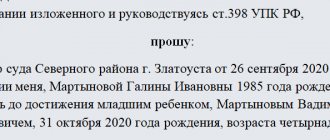Grounds for filing a cassation appeal in a criminal case
When considering criminal cases, it often happens that the parties do not agree with the verdict. But a request for a review of the case can only be made if there are serious grounds. These include:
- the use of unreliable facts, inadmissible evidence, false testimony that influenced the outcome of the trial;
- a violation of the rights of the client and/or his lawyer has been recorded;
- procedural norms for conducting criminal cases are not observed;
- the judge applied the wrong legislative norm of the Criminal Code of the Russian Federation, which was appropriate in this context;
- discrepancy between the crime committed and the punishment received.
Time limits for cassation appeal in criminal proceedings
The law does not actually limit the rights of citizens to appeal sentences in criminal cases. According to current regulations, there are no time limits for reviewing a decision. But in practice, it is necessary to act within the standard 10 days, which are counted from the moment the verdict is announced.
The cassation appeal will be accepted later, provided that there are compelling reasons explaining why the applicant did not apply for review earlier. The following are considered valid grounds:
- illness or injury;
- severe physiological or psychological disorders.
The court will restore the terms of application if there are other compelling reasons, if they are proven documented.
How is cassation different from appeal?
You can appeal the decision of the second or first instance to the Court of Cassation (if an appeal has not been filed).
The appellate court is similar in essence and procedural aspects to the criminal court. He actually reviews the case from scratch: newly discovered circumstances can be highlighted in the case, documents can be included, and even witnesses can be invited.
The Court of Cassation is deprived of all these points: it does not consider anything new, does not include documents, does not question witnesses. During the meeting, only compliance with the law is checked, that is, compliance of the proven facts with the current legislation of the Russian Federation.
The right to file a cassation appeal in court
There are many people involved in criminal trials, but not all of them can file an appeal requesting a review of the case. By law, the list of persons who have the right to file a complaint includes:
- The convicted person or his representatives, including a lawyer.
- The victim or those who represent his interests.
- Relatives of one of the parties, if the convicted person or victim has died or is in serious condition.
- Prosecutor (prosecutor).
- Private prosecutor or defense attorney, with a notarized power of attorney.
- Persons whose interests suffered after the announcement of the verdict.
Rules for considering a petition for reconsideration of a case
To consider the petition, a court hearing is scheduled, of which all participants in the process are notified. Failure of any participant to appear at meetings does not result in a postponement of the trial date. If it is impossible to appear in court in person, you can always send a representative, the main thing is that the representation in court is formalized in accordance with all the rules.
The court may grant the application, then the previous court decision is canceled and a new trial begins. But the court may refuse to satisfy the application. Any court decision can be appealed, for which it is necessary to file a private complaint.
Return to section Filing an application to court
Form and content of the cassation appeal
A cassation appeal, like a statement of claim, is drawn up in any order in compliance with the established structure of the text. But drawing up such a document on your own is extremely difficult. Higher courts will reject a complaint if there is the slightest error or inconsistency, so it is better to turn to specialists for its preparation.
The cassation is compiled according to the following structure:
- The header indicates the authority where the document is being submitted and on whose behalf.
- The text begins with a description of the essence of the criminal case in which cassation has been filed, with document numbers.
- The second block contains arguments that indicate the need for revision.
- In the final part, the expert draws conclusions about what, in his opinion, the sentence should be.
Each point is confirmed by references to legislative acts. The text should be clear, without water and reasoning.
Official website of the Supreme Court of the Russian Federation
The Plenum of the Supreme Court adopted decisions on appeal and cassation proceedings according to the rules of the Civil Procedure Code in courts of general jurisdiction.
The Plenum taught how to calculate deadlines for appeal and explained the consequences of missing them, explained what circumstances would become the basis for canceling a decision, and detailed the rule on higher legal education for representatives. Details of the above explanations are in our traditional cards. The new resolutions of the Plenum replace the existing rules of 2012. Therefore, as of today, Resolution No. 13 of June 19, 2012 and Resolution No. 29 of December 11, 2012 cease to apply.
The two decisions adopted by the Plenum of the Supreme Court are based on general principles. Many of the clarifications that were given for the appeal process also appeared in the decision on cassation appeal. We have combined the analysis of two documents into one material, but you can also read separate texts for each stage of the appeal, which we wrote during the preparation of the decisions: “Cassation in civil proceedings: clarifications of the Plenum of the Supreme Court” and “20 rules of appeal under the Civil Procedure Code from the Plenum of the Supreme Court "
The link to the final resolutions of the Plenum of the Supreme Court is at the end of the material.
1 Appeal procedure
The Supreme Court recalled that district courts review decisions of magistrates' courts in appeals, and city, regional and supreme courts of constituent entities - those that were adopted by district courts at first instance. Courts of appeal of general jurisdiction hear cases that were examined in the first instance by city, regional and supreme courts of the constituent entities.
You can file a cassation appeal only after the case has been considered on appeal. You can complain about the court decision as a whole, about part of it, about an additional decision, as well as about acts on issues of legal costs and the procedure and deadlines for executing the document. “If an appeal is filed not against a court decision as a whole, but only against a part of it or an additional decision, then in this case, the appealed decision does not enter into legal force,” the Plenum emphasizes.
2 Immediately to the cassation office
In some cases, the cassation instance will become the second. This is where you will need to go, for example, when appealing a ruling on approval of a settlement agreement or when challenging a court order.
It is necessary to immediately appeal in cassation the rulings in cases of challenging the decision of the arbitration court, issuing a writ of execution for the forced execution of the arbitration court decision, or refusing to issue it.
3 Who needs a diploma?
Patent managers and arbitration managers, trade union representatives and prosecutors will not need a diploma to participate in court. Legal representatives also do not have to provide a document on education, as well as representatives of organizations, for example, the general director. Instead, they need to bring paper to the court confirming their status.
“A copy of the document on education or academic degree must be notarized or certified by the institution and organization from which the corresponding document comes, the organization in which the representative works, or certified by the judge in whose proceedings the case is,” the Supreme Court advises.
At the same time, you do not need to bring your diploma or its certified copy to each authority. The plenum suggests that if a copy of the document is already in the case file, it does not need to be attached to the cassation. In this case, the court does not have the right to leave the complaint without progress.
4 Deadlines for appeal
The Plenum reminds that you can file a complaint against the act of the first instance within a month from the date of the decision.
So, if a reasoned decision was drawn up on July 31, then the last day for filing a complaint is August 31 - the date corresponding to the date of drawing up the reasoned decision. If there is no corresponding date in the next month, the deadline expires on the last day of that month. For example, when the motivation is drawn up on March 31, the last day of the deadline will be April 30.
If the last day of the period falls on a weekend or a non-working holiday, the end of such period is considered to be the first working day following it.
5 Deadlines for cassation
For cassation, the Plenum prescribed a similar rule - the last day of the three-month period will be considered the same day, but three months later. If the decision of the appellate instance was adopted on June 22, 2021, then the last day for filing a cassation appeal or presentation will be considered September 22, 2021.
6 Complaint to the Supreme Court
The Court of Cassation is not the last instance for appeal. Participants in the process also have the opportunity to appeal to the Supreme Court. The Plenum explains that if only the operative part of the decision was announced at the cassation court meeting, then the three-month period for the appeal of the Supreme Court still needs to be counted from this day. The date the “motivation” was drawn up will not affect the deadline.
7 Restoring deadlines
If the applicant missed the deadline for appeal, he must file a petition for its restoration along with an appeal or cassation complaint.
In the event of an appeal, such a statement will be considered in the first instance. In this case, the judge studying it will have to explain why he decided to restore the term or refused to do so.
The judge of the court of cassation considers such petitions alone, without holding a court hearing. A request to restore the procedural deadline may also be contained directly in the cassation appeal, the Plenum suggests.
A judge can satisfy an application to restore the deadline only if circumstances that objectively exclude the possibility of filing a cassation appeal “occurred within a period no later than one year from the date the appealed court decision entered into legal force.” No such rule was prescribed for appeal.
8 Complaint by mail and on the court website
The deadline for filing an appeal will not be considered missed if the applicant managed to take it to the post office before 23:59 on the last day of the deadline. In this case, the date of filing the complaint is determined by the stamp on the envelope or the receipt of registered mail.
If the applicant uploaded the complaint through the court’s website, then the time of its filing will be counted from the moment of “receipt in the relevant information system.”
9 Missing a deadline: good reasons
The Plenum includes as valid reasons for missing a deadline both “objective circumstances” such as emergencies and incidents, and circumstances related to the applicant’s personality: illness, death of a relative and “other situations requiring the personal participation of the applicant.”
In addition, there are procedural reasons for reinstating the deadline. For example, late receipt of a copy of the decision from the court or failure to participate in the trial court, which occurred due to a court error. Violation of the right of participants in the process to familiarize themselves with the case materials and copy these materials is also a reason for reinstating the term.
10 Director's vacation and lack of money for a lawyer
At the same time, the Supreme Court urged the courts not to consider the presence of the director of an organization on a business trip or on vacation as a valid reason for missing a deadline. The absence of a lawyer on the staff of the organization and the reference to the lack of money to pay for the assistance of a representative or to pay the state fee will also not help restore the deadline, as will the untimely execution of a power of attorney by a higher organization.
11 Mistakes with the court
According to the rules of the Code of Civil Procedure, appeals and cassation complaints must be filed through the court that heard the case in the first instance. Otherwise, higher courts must return the complaint. But the Plenum made useful clarifications for erroneous applicants. In such cases, the document does not need to be returned to the applicant - the court itself must send it to the first instance to carry out all necessary procedural actions.
12 Errors in the complaint
The Plenum in its explanations stated that the court does not have the right to leave the complaint without progress due to shortcomings and errors in the preparation of the complaint. So grammatical or technical errors or typos will not interfere with the consideration of the appeal or cassation.
13 New evidence: when you can and when you can’t
As a general rule, the appellate court does not examine new or additional evidence in the case. But the Plenum establishes the right of the parties in some cases to still provide such evidence.
For example, this is possible if the first instance unreasonably rejected the request to include evidence. But new evidence will not be examined if it turns out that the applicant abused his procedural rights and deliberately concealed them from the first instance.
Unlike an appeal, where options are possible, for cassation proceedings the Supreme Court leaves no loopholes - new evidence will not be considered in any case.
14 From Civil Procedure Code to CAS
If, during preparation for the hearing, the appellate or cassation judges decide that the dispute between the parties should be considered in administrative proceedings, then they must make a decision to proceed to consideration according to the rules of the CAS.
15 The decisions will be checked in full. Sometimes
The Plenum secured the right of appeals and cassations to go beyond the arguments of the appeal.
In some cases, an appeal can review the trial court's decision in its entirety – if it is “in the interests of legality.” The Plenum includes among such “interests” the protection of the family, ensuring the right to housing, health protection, ensuring the right to a favorable environment, education, as well as the need to protect law and order.
And if the appealed part of the decision is conditioned by another part of it, which is not appealed by the applicant, then this part of the decision is also subject to verification - both in appeal and in cassation. In this case, the court must explain why it went beyond the arguments of the complaint.
16 Time saving
Many provisions of the two resolutions are aimed at saving time for both judges and participants in the process.
If a disputant appeals any interim court ruling, for example, a refusal to secure a claim, then the initial process will not be paused. The first instance should select only the necessary materials and send them to the cassation instead of sending the entire case. In this case, the appeal and cassation may require you to send them additional documents or request all materials on the case.
17 Results of the appeal
The Plenum reminds: the result of satisfying the appeal should be a new decision or determination to terminate the proceedings. As a general rule, sending a case for a new trial to the court of first instance is not allowed.
In cassation there are different rules. The third instance, on the contrary, should make a new decision on the case only in cases where the lower courts have established “all legally significant circumstances for the correct resolution of the case.”
If the cassation court, following the results of consideration of the complaint, returns the case for a new consideration, it will also give the lower court instructions on how to apply the rules of substantive and procedural law. Such instructions are binding on the court, which will rehear the case.
Resolution of the Plenum of the Supreme Court dated June 22, 2021 No. 16 “On the application by courts of the norms of civil procedural legislation governing proceedings in the court of appeal.” Resolution of the Plenum of the Supreme Court dated June 22, 2021 No. 17 “On the application by courts of the norms of civil procedural legislation governing proceedings in the cassation court.”
Maxim Varaksin









